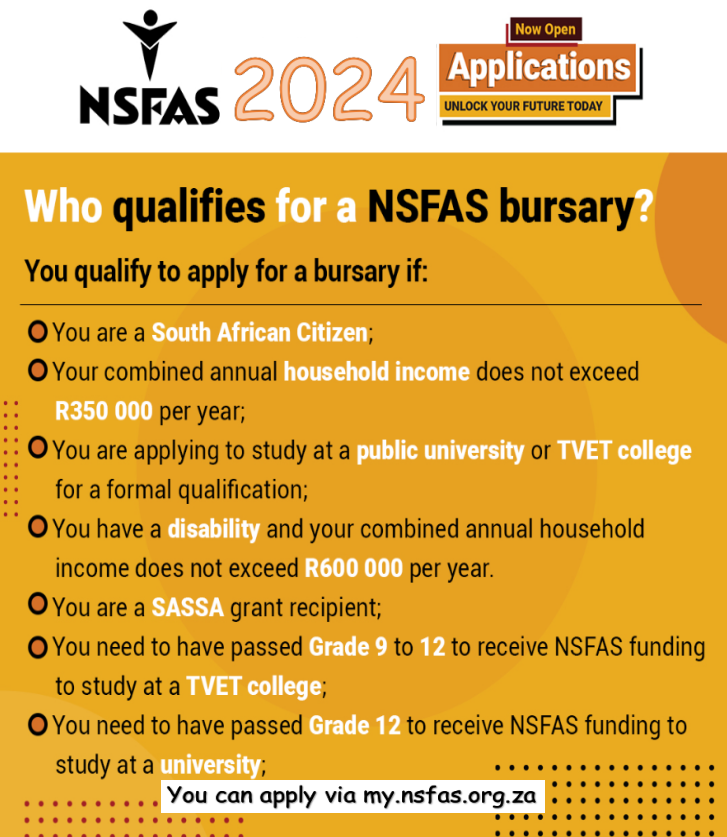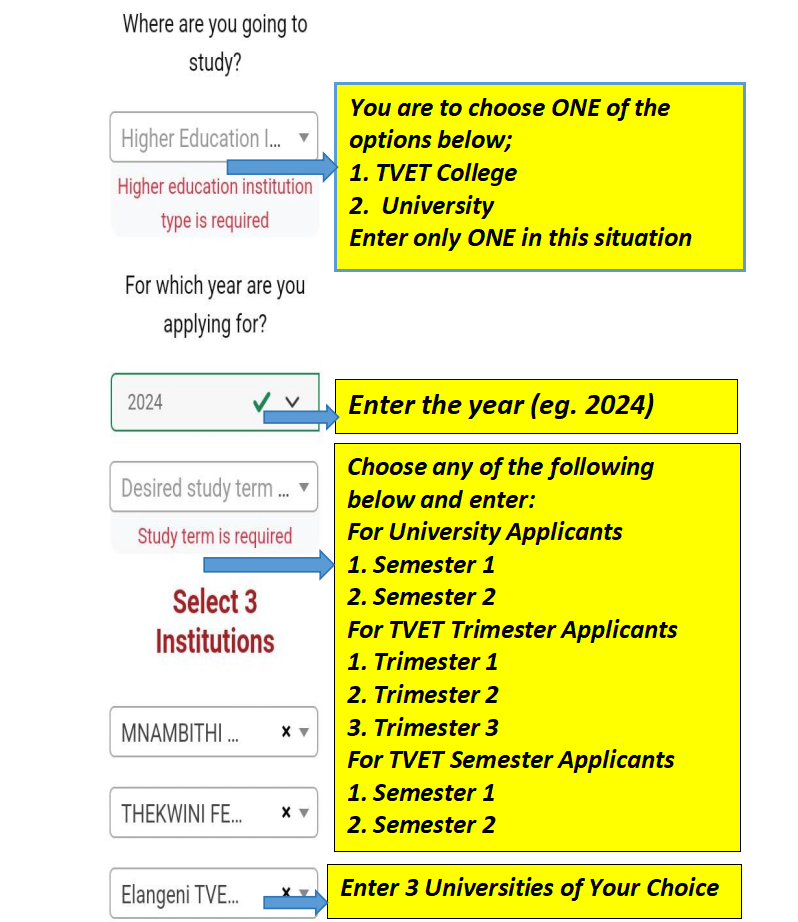How to apply for Nsfas for University of Johannesburg How to apply for Nsfas for Stellenbosch University
You need to have passed Grade 9 to 12 to receive NSFAS funding to study at a TVET college and Grade 12 to receive funding to study at a university or TVET college. If you are approved for NSFAS funding, you will be required to meet the academic admission requirements of the university or TVET college before NSFAS allocates any funding to you.

No, if you are currently funded by NSFAS, you are not required to reapply.
How to apply for Nsfas for Mangosuthu University of Technology How to apply for Nsfas for Central University of Technology How to apply for Nsfas for Durban University of TechnologyApplying for nsfas requires you to meet the following requirements namely: Must be South African citizen / permanent resident, Combined gross household income should not exceed R350 000 per annum, Combined gross household income (persons living with disabilities) should not exceed R600 000 per annum, SASSA recipients automatically qualify on financial eligibility or must have email and cell phone number.
No, if you are currently funded by NSFAS, you are not required to reapply.
In order to apply for nsfas funding, you will need to visit the mysfas website to create an account if you’re a new applicant and for an old applicant you just log in. Then you select the apply tab to the online application form. How to apply for Nsfas for Cape Peninsula University of Technology
How to apply for Nsfas for Mangosuthu University of Technology How to apply for Nsfas for Central University of Technology How to apply for Nsfas for Durban University of TechnologyAll applicants are required to submit: Certified copy of your ID, not older than 3 months A signed and completed consent form. If you are dependent on your parents/guardian/spouse, please provide: Certified ID copies of parent/s, guardian, spouse not older than 3 months Proof of income of parent, guardian or spouse (payslip or appointment letter If you are self-sufficient (no parent/guardian support) please provide: Proof of income (payslip or appointment letter). If you have a disability, please provide: Completed and signed Annexure A (if your information is not pre-populated on the portal). If you are an orphan, please provide: Completed and signed Declaration Form, Other documents required, if applicable: Retrenchment letter / UIF documentation; Death certificate/s; Divorce decree.
Application process for students with disabilities
If you have a disability, you must complete Annexures A and B and attach proof of disability and quotation for assistive devices with the application form.
Students on a full NSFAS bursary may not receive another full cost of study bursary from another source at the same time. If a student receives a partial bursary from another source, a NSFAS bursary may be awarded, but the allocations must be reduced accordingly, so that the student is supported fully for their studies. NSFAS may not pay for amounts already covered by another funder. Any excess funding must be refunded to NSFAS by the Institution. A student may not receive funding in excess of the DHET National Rules and guidelines.
How to apply for Nsfas for Mangosuthu University of Technology How to apply for Nsfas for Central University of Technology How to apply for Nsfas for Durban University of TechnologyNo, Nsfas does not fund students who have not completed and passed their matric exams. Matric Certificate is proof of your successful completion of Grade 12.
In order to be funded by nsfas, you need to have passed Grade 9 to 12 to receive NSFAS funding to study at a TVET college and Grade 12 to receive funding to study at a university or TVET college. If you are approved for NSFAS funding, you will be required to meet the academic admission requirements of the university or TVET college before NSFAS allocates any funding to you.
These include adult learning, mechatronics, media studies, building construction, music, civil engineering construction, nature conservation, cleaning, domestic, hiring, property, and rescue services, occupationally directed ETD practice, communication studies, office administration, consumer services, people/human-centered development, cultural studies, performing arts, curative health, personal care, design studies, physical planning, design, and management, drawing office practice, physical sciences, early childhood development, preventive health, earth and space sciences, primary agriculture, electrical infrastructure construction, process instrumentation, engineering and related design, process plant operations, environmental relations, procurement, environmental sciences, project management, fabrication and extraction, promotive health and developmental services, film television and video, psychology, finance, economics, and accounting, public administration, forestry and wood technology, public policy, politics, and democratic citizenship, general social science, public relations, generic, rehabilitative health/services, generic management, religious and ethical foundations of society, higher education and training, rural and agrarian studies, horticulture, safety in society, hospitality, tourism, travel, gaming, and leisure, human resources, secondary agriculture, industrial & organizational governance and HR development, sovereignty of the state, information studies, sport, information technology and computer sciences, traditions, history, and legacies, justice in society, transport, operations, and logistics, language, life sciences, urban and regional studies, literature, visual arts, manufacturing and assembly, wholesale and retail, marketing, and mathematical sciences.
What to enter on the "where are you going to study" part of the application process
